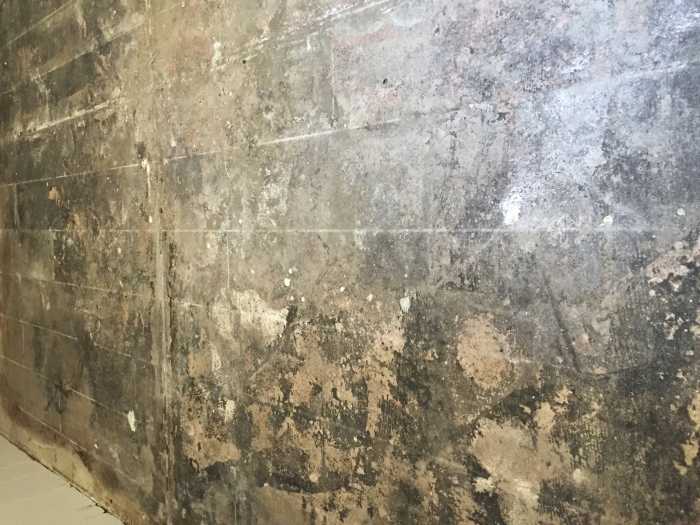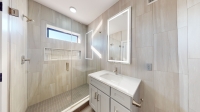Damp Basement - how do you fix this?
Make sure the ground outside is graded away from the house throughout. Grading is one of the most frequent causes of issues.
It sounds like you are doing everything possible. Are there any walls which do not have a French drain along them?
Is your house on a hill? If so, the water outside could be flowing down hill and hitting the side of your house underground.
Our house is on a hill and the water tends to flow from the back of the lot (the high part of our property) to the front. Our French drain runs along the entire backwall of our basement, along a side wall in the unfinished section and drains into our sump pump. We have wood paneling in our finished section, which hampers our ability to see what is truly going on with the foundation.
My parents think the tile drains are not functioning properly. Of course I have no clue what that even means.
You could also have an underground stream running beneath the house. These are quite common in Maplewood and can result in water coming up through the floor from time to time.
joan_crystal said:
You could also have an underground stream running beneath the house. These are quite common in Maplewood and can result in water coming up through the floor from time to time.
This is possible, but how do we keep water from seeping though the concrete floor?
Maui said:
joan_crystal said:
You could also have an underground stream running beneath the house. These are quite common in Maplewood and can result in water coming up through the floor from time to time.
This is possible, but how do we keep water from seeping though the concrete floor?
When we redid our basement, we had to dig out a portion of the concrete which was a foot higher than the rest of the basement, and in preparation for the pouring of the new concrete, a plastic barrier had to be placed between the soil/rock and the new concrete. This was a code requirement from what I understand and it would prevent water from going up the concrete. Not sure what the options are on an existing floor however.
It sounds like you only have french drains on some sides, not all, correct? You might need to have them on all sides leading to one or two sump pump pits which will then direct the water away from your house. We had a water issue in our basement (came up through the floor when the water table was high) and used Gregory Waterproofing to put in a french drain system and new sump pit and pump since clearly the one done by the previous owner was no longer doing its job! Since then (5 years ago) we have had no trouble, thank goodness. Basement issues are very frustrating. I wish you the best! You could also contact Avellino in addition to Gregory to get their opinion/estimate on waterproofing.
We had a similar problem in my maplewood home- i found the source of water during a storm which was coming up in the center of the home - had avellino come in and do a french drain through the center and then tapped into to the back wall french drain and it resolved the problem.
Correct, the French drain is not running along all walls of the basement, just a portion. I guess we'll need to call someone to investigate.
one simple attack is to dig the sump pump deeper, thus lowering the water table. This helped a lot in my house. Other item, concrete floors are porous, and the laminate does not let moisture evaporate.An epoxy sealer may be the answer. Good luck.
Your concrete floor moisture issue is probably due to the slab not being poured over a vapor barrier. As example, my home (1907) is right over the dirt.
Here are some links that explain what I mean, but in essence, regardless of actual water running into your basement, the concrete will breath. When the ground below it is not covered by a barrier, then the moisture is wicked up into the basement floor. Uncovered, you won't notice as the moisture evaporates into the space but when you place something like flooring over it, you are essentially creating a vapor barrier on the top side of the slab trapping the moisture, also creating a haven for mold and mildew.
Old basements weren't really created as living space and when they are modified, even using best practice and technology, the result is often moisture problems. You might want to consider leaving the slab uncovered and place a few area rugs over it. Then at least the moisture will not collect.
http://www.cement.org/for-concrete-books-learning/concrete-technology/focus-on-floors/concrete-floors-and-moisture
http://www.buildingscience.com/documents/insights/bsi-003-concrete-floor-problems
Thanks, @rowerg. This makes sense, the floor is much drier now that it has been allowed to breath for the last three days. We needed to put down some plastic in a small area, to keep some furniture protected, and the section with the plastic on the floor is still damp.
I wish our floor was in decent shape, as I might consider keeping the concrete open to the air to breath...this certainly works well in our unfinished section. Unfortunately for some weird reason the concrete in our "finished" section is in pretty bad shape. See attached photo. I think it would take an incredible amount of work to prep, just to make it look decent.
We're calling around for some consultations, but I'm still thinking that the best route is to install ceramic tiles for the flooring. Is there anything negative I should consider, when going that route? The floor itself is fairly level.
AcuRite Digital Humidity and Temperature Monitor
http://www.walmart.com/ip/AcuRite-Digital-Humidity-and-Temperature-Monitor/16888914
Maui said:
we have an industrial dehumidifier for 1200sq ft (our basement is half the size).
We installed tile in our basement because you just never know when you will have a water issue. It may never happen, or we may have another Sandy and no power for the sum pumps to work. If you can use tile in a bathroom and a shower, which are constantly wet, they should handle the wetness of the basement (I would think, but I am not an expert of any sort).
here is a decent article on choices for basements: http://www.bobvila.com/articles/basement-flooring-101/#.VUkM2qZM25M
should a sump pump be located only where i actually get water in my basement? or can i put it anywhere, with french drains sloped down to the sump pump? I also have a property that slopes from high to low, and i only get water in the high part of the wall.
Rentals
-
Huge Brand New construction Apartment in 2 family home with 4 bedrooms 3 bathrooms
4 Bd | 3Full Ba
$4,500
Featured Events
-
Stephen Whitty Presents - Hometown Movie Stars: The Celebrated Actors Of CHS
May 6, 2024 at 7:00pm



























To give some history, we have two sections in our basement, one side is unfinished with a sump pump and exposed French drains. In this section the foundation walls tend to get wet when we had lots of rain, but the French drain does its job steering the water to the sump pump. The other sectioned of our basement is finished and has a French drain running along the backwall, which ties into the other French drain. In the finished section, we've had some water seep through the floor, in the middle of the room; this has only happened a couple of times...or so we thought. It appears the lovely laminate flooring we ripped out was masking the water problems. This isn't standing water, it's more like the floor is really damp. The unfinished section does not have this issue. We've been diligent in ensuring our gutters are doing their jobs properly, we have extenders on the downspouts to move the water away from the house, our sump pump is working well and we have an industrial dehumidifier for 1200sq ft (our basement is half the size).
Before we can install our new flooring, we now need to figure what the issue is...I'm not quite sure where to even begin. I personally want to throw my hands up in the air and just install the nice ceramic tile that looks like hardwood floors and call it a day, but my husband wants to find out what is really wrong and get it fixed. All I see is $$$$$ flying out the window.
Any suggestions? Solutions? Who would we call?